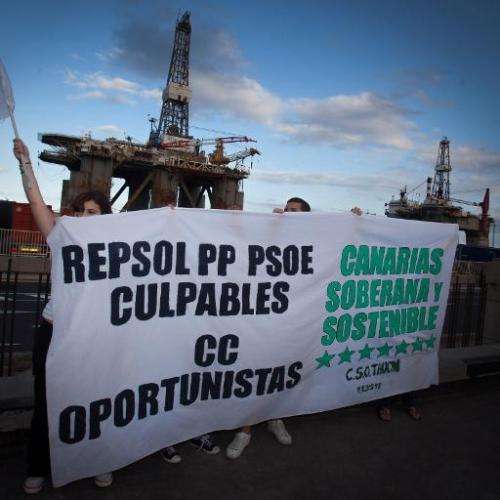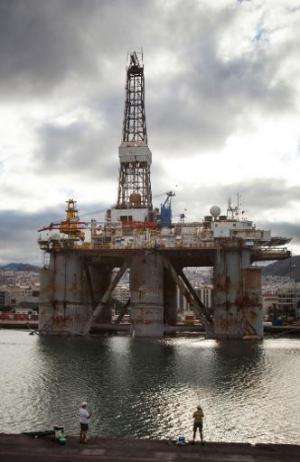Repsol scraps oil probe off Canaries tourist islands

Energy giant Repsol abandoned its controversial search for oil and gas off Spain's Canary Islands Friday, delighting locals and environmentalists but dashing Madrid's hopes that the project would ease its energy dependency.
The prospecting had outraged leaders on the islands, a Spanish archipelago off the coast of north Africa, whose beaches and volcanic landscapes are a major draw for tourists from Britain, France and elsewhere.
After two months of exploration two kilometres (1.2 miles) below the sea bed some 50 kilometres from the islands of Lanzarote and Fuerteventura, Repsol said in a statement it only found small deposits that were not worth drilling.
"The exploratory survey confirmed that oil and gas have been generated in the basin, although the deposits found have been saturated with water and the hydrocarbons present are in very thin, non-exploitable layers," it said.
The abandonment did not appear to be linked to the dramatic recent fall in crude oil prices, which have plunged some 60 percent since June, of which Repsol's statement made no mention.
The announcement relieved local authorities who had campaigned against the plan, fearing it would harm dolphins and other wildlife and the islands' tourist industry. More than 10 million tourists visited the Canaries in 2013.
"The failure of Repsol is a success for the whole Canaries and a guarantee that we can live in peace and quiet," said the regional president of the islands, Paulino Rivero.
Energy dependency
The news was a blow however to the Spanish government, which had hoped to provide new sources of fuel for a country that imports 80 percent of its energy.
The project had also raised the prospect of new jobs in a region with an unemployment rate over 30 percent.

"This is bad news for the Canaries and for Spain," said the deputy head of the industry ministry, Enrique Hernandez Bento, on radio station Onda Cero.
Madrid resisted fierce opposition from the Canaries authorities, who accused the government of putting the company's interests before local residents'.
A poll in November by the regional government showed three out of four Canaries residents were opposed to the plan.
When the regional authorities vowed to hold a referendum on the issue, the national government blocked the move by appealing to Spain's Constitutional Court.
Fears for dolphins, turtles
International group Greenpeace and other local environmental campaigners had launched seaborne protests near the site of the exploration. Spanish authorities temporarily impounded Greenpeace's protest boat Arctic Sunrise in November.
On November 15, three Spanish navy boats rammed vessels in which Greenpeace activists were approaching the Rowan Renaissance, the boat Repsol used for the exploration, a video distributed by Greenpeace showed.
An Italian protester fell in the water and was hurt, Greenpeace said. It said its activists were protesting peacefully.

Greenpeace on Friday welcomed the end of the project but demanded Repsol and the government carry out an evaluation of its impact on wildlife in the area.
The prospecting produces sound pollution as well as using chemicals to probe under the sea bed, both of which can harm dolphins and sea turtles, it said in a statement.
The Spanish group Ecologists in Action called for other explorations in the Mediterranean off Spain east coast and the Balearic Islands to be scrapped too.
Repsol is taking over its Canadian competitor Talisman, which it has said it is buying for $8.3 billion (6.6 billion euros).
That would turn it into one of the 15 biggest energy companies in the world.
The Spanish firm lost its business in Argentina when the country's government nationalised its subsidiary there in 2012.
That dispute was settled last year, with Repsol pocketing $6.3 billion in compensation and asset sales.
It is now looking to expand in north and Latin America and to get a foothold in Asia.
© 2015 AFP





















